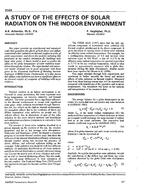Intuitively, gas savings are possible by reducing the thermostat temperature during the night. Numerous experimental and analytical studies confirm this. However, associated with night setback is usually some degree of discomfort to the occupants of the residence. In the morning ‘when the thermostat is set up to its daytime temperature, the space temperature does not respond immediately but rises slowly due to the heat capacity of the structure and the finite heating capacity of the furnace. This delay, or recovery time, is undesirable and best kept to a minimum.
One way to deal with this situation is to reduce the effective hours of the delay by setting up the thermostat before arising in the morning. Another method is to directly reduce the recovery time by installing a large furnace.
Both methods have the disadvantage of reducing energy savings. The first reduces savings because it reduces the hours of night setback and the second reduces savings because the seasonal operating efficiency of furnaces decreases as furnace oversize increases. This paper covers the effects of night setback and furnace sizing on both energy savings and recovery times and shows that an optimum furnace size and level of setback depends on the relative importance placed on energy savings and short recovery.
Product Details
- Published:
- 1978
- Number of Pages:
- 17
- File Size:
- 1 file , 930 KB
- Product Code(s):
- D-AL-78-01-2
- Note:
- This product is unavailable in Russia, Belarus


